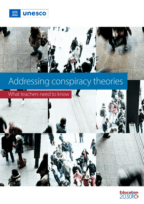Fonte:
https://www.unesco.org/en/articles/addressing-conspiracy-theories-through-education-unesco-guidance-teachers
Addressing conspiracy theories through education: UNESCO guidance for teachers
Conspiracy theories thrive in troubled times with serious real-world impacts. In the horrific mass murder recently targeting African-Americans in the U.S. city of Buffalo, the alleged suspect invoked the false “Great Replacement” conspiracy theory, which purports there is a plot to replace people of European ancestry, driving an international white supremacist narrative founded on racism, antisemitism and anti-Muslim hatred.
Education can play a central role in building the resilience, knowledge and analytical skills needed to “pre-bunk” and debunk conspiracy theory narratives, including through media and information literacy. To strengthen educational responses through advocacy, research and training, UNESCO and the European Jewish Congress organized the International Symposium on Addressing Conspiracy Theories through Education on 27 June 2022 in Brussels to convene academia, governments, civil society and the private sector for joint action.
“Whenever there is another murder, killing spree or terrorist attack, whenever there is a new manifesto chock full of conspiracy theories and hatred … Whether you think of Utoya, Norway, or Christchurch, New Zealand, of Halle or Hanau in Germany, of Pittsburgh or El Paso in the U.S., or Buffalo, New York, just a few weeks ago, each and every time it was conspiracy theorists who became the perpetrators of unfathomable violence,” Tobias Ginsburg, a journalist and theater director who has investigated German conspiracy theorists and right-wing fringe group, said at the symposium.
Guidance for teachers and educators
The event also launched UNESCO’s advocacy report ‘Addressing conspiracy theories: what should teachers know?’ The report is an introduction for educators, working in and outside of formal schooling, on how to identify, prevent and address conspiracy theories. It seeks to provide educators with key definitions and essential knowledge to grasp the complexity of the phenomenon and alert learners about the key characteristics and harmful effects of conspiracy theories for a first, immediate response.
“The fight against conspiracy theories, and the antisemitic and racist ideologies they often convey, begins at school, yet teachers worldwide lack the adequate training. That is why today, UNESCO is launching a practical guide for educators, so they can better teach students how to identify and debunk conspiracy theories,” Audrey Azoulay, UNESCO Director-General, said. “This builds on the wider work we’re doing to strengthen media and information literacy to better prepare learners to navigate a world of algorithms, artificial intelligence and invasive data collection.”
The complexity of conspiracy theory narratives and the psychological mechanisms that underpin belief make challenging them very difficult. This symposium and report support educators to:
- Explain why conspiracy theories are so popular and how they cause damage.
- Help to identify and dismantle conspiracy theories.
- Share strategies to develop people’s resilience to conspiracy theories.
- Providing practical advice on when and how to speak with learners who believe in conspiracy theories.
- Help teachers to create a classroom climate that is conducive to respectful dialogue and critical thinking.
The public symposium was followed by a closed expert segment to identify ways to integrate an educational lens into existing research and advocacy projects on conspiracy theories to strengthen education systems in response to this global phenomenon.
“It is all the more important to prevent people from adopting conspiracy theories at an early stage and to build resilience in society and educational systems,” Nicola Beer, Vice-President of the European Parliament and Special envoy on combating religious discrimination, including antisemitism. “Teachers have such great influence on our youth. It is crucial to be able to discuss mechanisms and the danger of conspiracy theories in classrooms, strengthen critical thinking as well as empathy in order to challenge stereotypes and hatred.”
The report is based on the Conspiracy Theory Handbook and informed by UNESCO’s work on media and information literacy, preventing violent extremism, addressing antisemitism and addressing hate speech. UNESCO’s #ThinkBeforeSharing social media campaign jointly launched in 2020 with the European Commission in cooperation with Twitter and the World Jewish Congress to respond to the growing spread of conspiracy theories during the COVID-19 pandemic. The symposium is organized in cooperation with the European Commission, the Cambridge University Social Decision-Making Lab and the Alfred Landecker Foundation.


